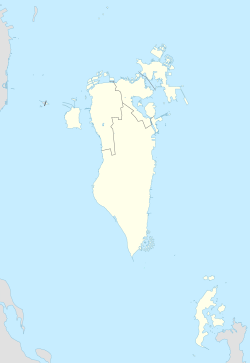Al Manama
|
Manama المنامة al-Manāmah |
|
|---|---|

Manama skyline
|
|
| Location of Manama in Bahrain. | |
| Coordinates: 26°13′N 50°35′E / 26.217°N 50.583°ECoordinates: 26°13′N 50°35′E / 26.217°N 50.583°E | |
| Country | Bahrain |
| Governorate | Capital |
| Government | |
| • Governor | Hisham Bin Abdulrahman Bin Mohammed Al Khalifa |
| Area | |
| • City | 30 km2 (10 sq mi) |
| Population | |
| • Estimate (2010) | 157,474 |
| • Density | 5,200/km2 (13,000/sq mi) |
| • Urban (2015) | 411,000 |
| • Capital Governorate (2010) | 329,510 |
| Time zone | GMT+3 |
| Website | Official website |
Manama (Arabic: المنامة Al Manāma) is the capital and largest city of Bahrain, with an approximate population of 157,000 people. Long an important trading center in the Persian Gulf, Manama is home to a very diverse population. After periods of Portuguese and Persian control and invasions from the ruling dynasties of Saudi Arabia and Oman, Bahrain established itself as an independent nation during the 19th century period of British hegemony.
Although the current twin cities of Manama and Muharraq appear to have been founded simultaneously in the 1800s, Muharraq took prominence due to its defensive location and was thus the capital of Bahrain until 1921. Manama became the mercantile capital, and was the gateway to the main Bahrain Island. In the 20th century, Bahrain's oil wealth helped spur fast growth and in the 1990s a concerted diversification effort led to expansion in other industries and helped transform Manama into an important financial hub in the Middle East. Manama was designated as the capital of Arab culture for the year 2012 by the Arab League.
The name is derived from the Arabic word المنامة (transliterated:al-manãma) meaning "the place of rest" or "the place of dreams".
There is evidence of human settlement on the northern coastline of Bahrain dating back to the Bronze Age. The Dilmun civilisation inhabited the area in 3000 BC, serving as a key regional trading hub between Mesopotamia, Magan and the Indus Valley civilisation. Approximately 100,000 Dilmun burial mounds were found across the north and central regions of the country, some originating 5,000 years ago. Despite the discovery of the mounds, there is no significant evidence to suggest heavy urbanisation took place during the Dilmun era. It is believed that the majority of the population lived in rural areas, numbering several thousands. Evidence of an ancient large rural population was confirmed by one of Alexander the Great's ship captains, during voyages in the Persian Gulf. A vast system of aqueducts in northern Bahrain helped facilitate ancient horticulture and agriculture.
...
Wikipedia

